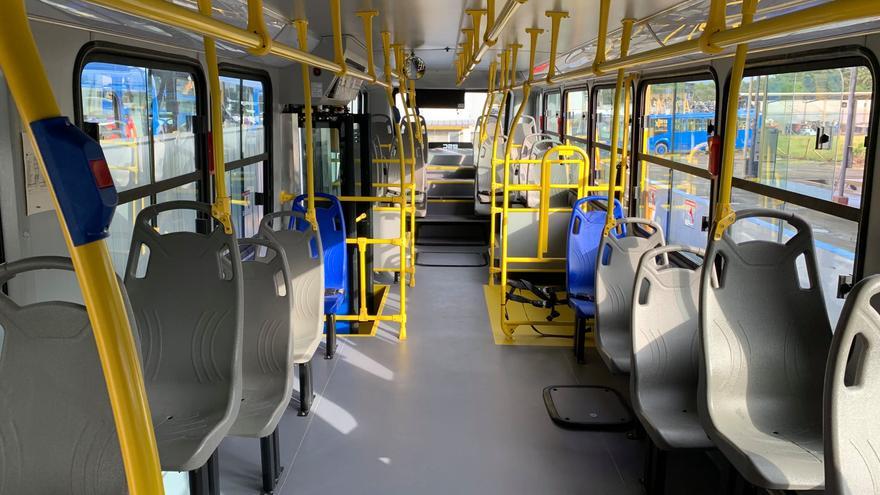
![]() 14ymedio, Havana, 13 January 2022 — The poor fleet of Havana buses will have a face lift thanks to the donation of 84 Japanese buses scheduled to arrive on the Island on Thursday.
14ymedio, Havana, 13 January 2022 — The poor fleet of Havana buses will have a face lift thanks to the donation of 84 Japanese buses scheduled to arrive on the Island on Thursday.
The Cuban ambassador in Tokyo, Miguel A. Martínez, announced on social networks that the vehicles left Colombia on January 9, where they were assembled by the Busscar company thanks to an agreement with Itochu Corporation and Isuzu Motors. According to official documents, the donation has a value of about 9 million dollars.
The shipment is part of the non-reimbursable financial aid, one of the sections of the agreements that Japan has had with Cuba since 1961. In this case, the buses belong to the economic and social development program in its Transportation section, which plans to take advantage of the “technological superiority of Japan” to help improve and maintain such infrastructure.
The imports, however, will not be enough to cover the shortcomings of the State’s fleet. At the end of last year the bus deficit reached 49% of the total fleet in the capital.
Of 878 buses, only 435 travel the streets of Havana, and many of them do so with serious mechanical and structural damage, as this newspaper has documented in recent weeks. Henry Aldama, head of the Provincial Directorate of Transportation, acknowledged last December to the official press that of the 435 urban buses that left in the morning, fewer than 400 remained on the road by noon.
In a meeting of the authorities of the capital in which the arrival of the buses was announced, Governor Reinaldo García Zapata demanded better maintenance on the roads along which the routes circulate and promised that the care of the brand new Japanese vehicles will be ensured. The buses are the first to arrive in the country in four years. The official said that the new buses “will make it possible to improve the public service, which has deteriorated greatly in the last stage due to breakages, lack of parts, tires and batteries,” according to the official newspaper Tribuna de La Habana.
The general director of Provincial Transport, Leandro Méndez Peña, explained that the causes of the deterioration in the public transport system were due to “a serious problem with financing and foreign suppliers” that made it difficult to make new purchases and acquire the parts and pieces necessary for the maintenance or repair of damaged buses.
Overuse, improper handling, the quality of the roads and the precariousness of vehicle maintenance have resulted in 443 vehicles out of service, and around 60 paralyzed due to “total breakdowns in the engines,” added Méndez Peña. The rest of the vehicles are not working due to the “lack of tires, batteries, oil filters and even material to cover the punctures.”
Faced with the constant complaints from riders, who accuse the Government of not guaranteeing the necessary fuel for transportation in the capital, the official pointed out that “there is availability to cover the buses that are in operation.”
The new Japanese vehicles will be destined for the Guanabo (59) and Bahía (25) terminals, both located in the peripheral municipality of La Habana del Este. The old buses that currently operate from these bases will be redistributed to the terminals of Diezmero in Cotorro and Fortuna in La Lisa. The remaining municipalities will have to wait for a future donation to meet their transportation needs.
Japan’s cooperation with Cuba, in force for 60 years, intensified from the 1990s with coverage also for community projects for human security and cultural assistance.
The Large-Scale Non-Reimbursable Financial Assistance agreement was negotiated in 2015 and its first project was signed during the visit to Cuba of Japanese Prime Minister Abe in 2016. In April 2019, the first installment of a donation of 100 trucks for the garbage collection .
In February, 13 units of X-ray equipment and 500 units of suction equipment will arrive as part of these agreements. In addition, last October, Tokyo sent 44 ultrasound stations manufactured by Fujifilm to the island for the diagnosis of various pathologies.
____________
COLLABORATE WITH OUR WORK: The 14ymedio team is committed to practicing serious journalism that reflects Cuba’s reality in all its depth. Thank you for joining us on this long journey. We invite you to continue supporting us by becoming a member of 14ymedio now. Together we can continue transforming journalism in Cuba.
